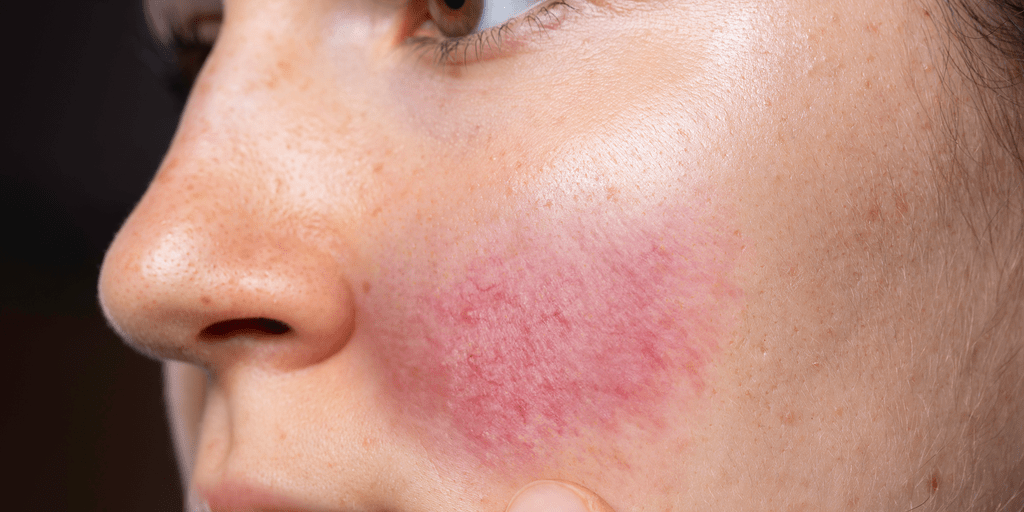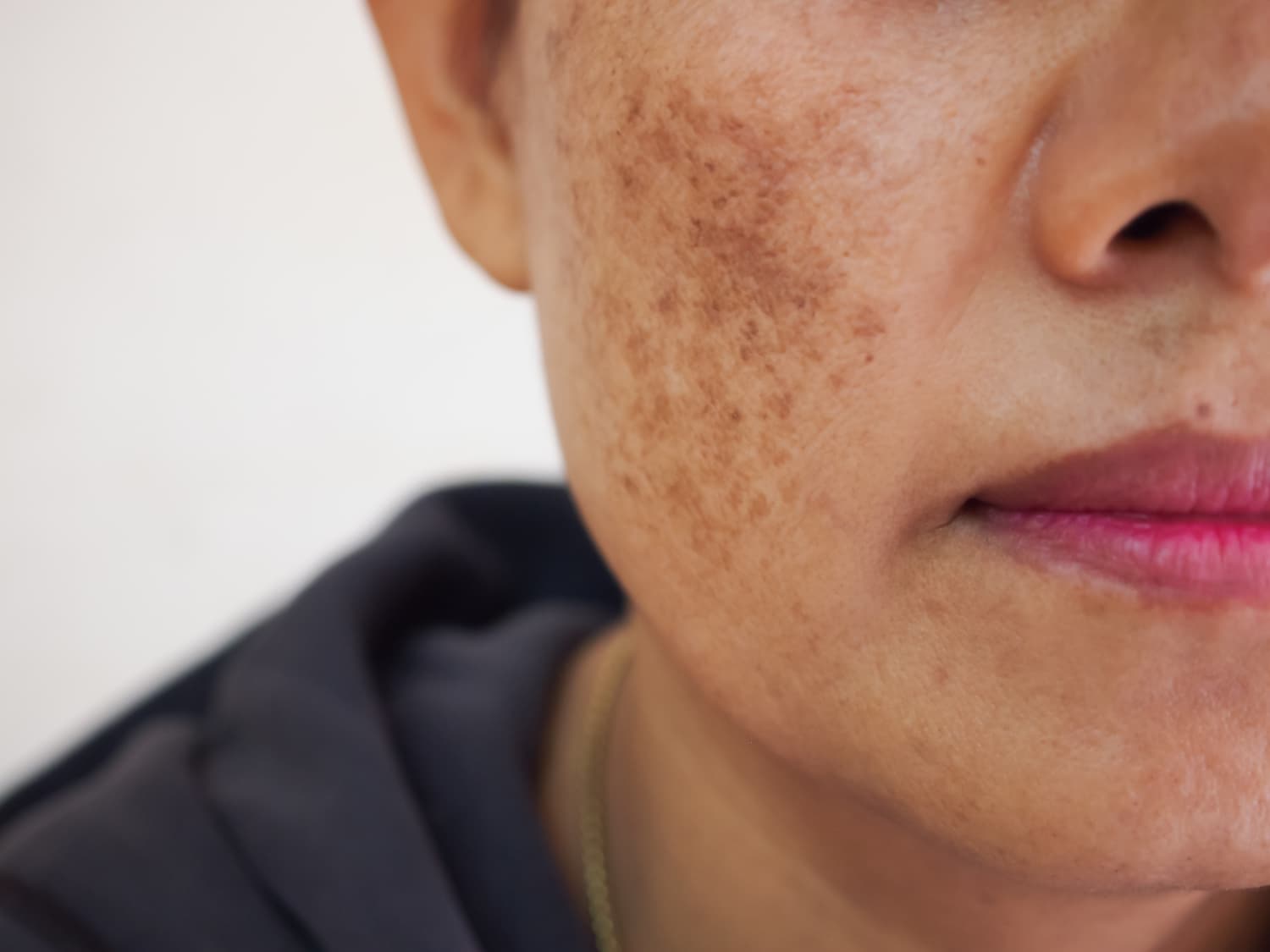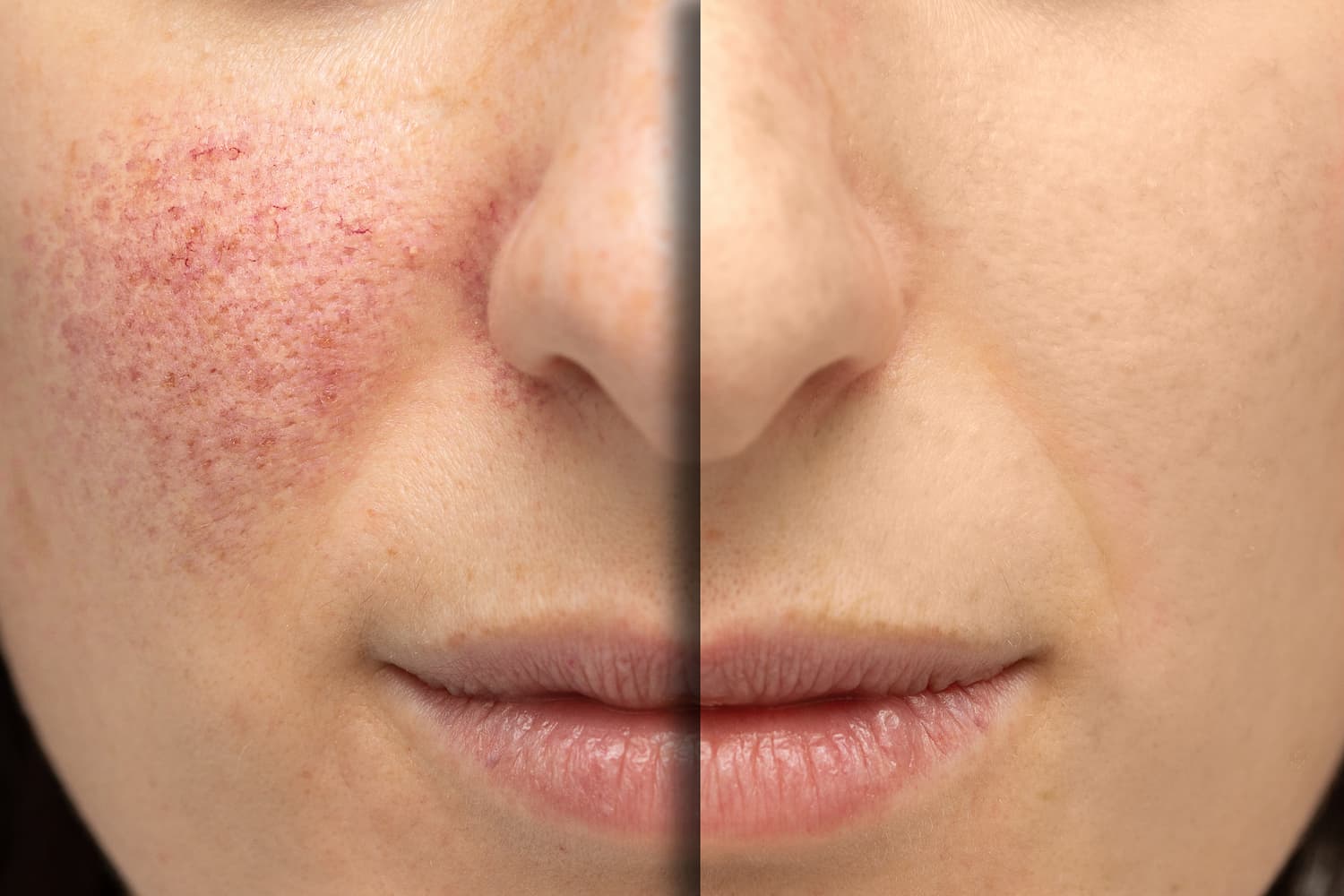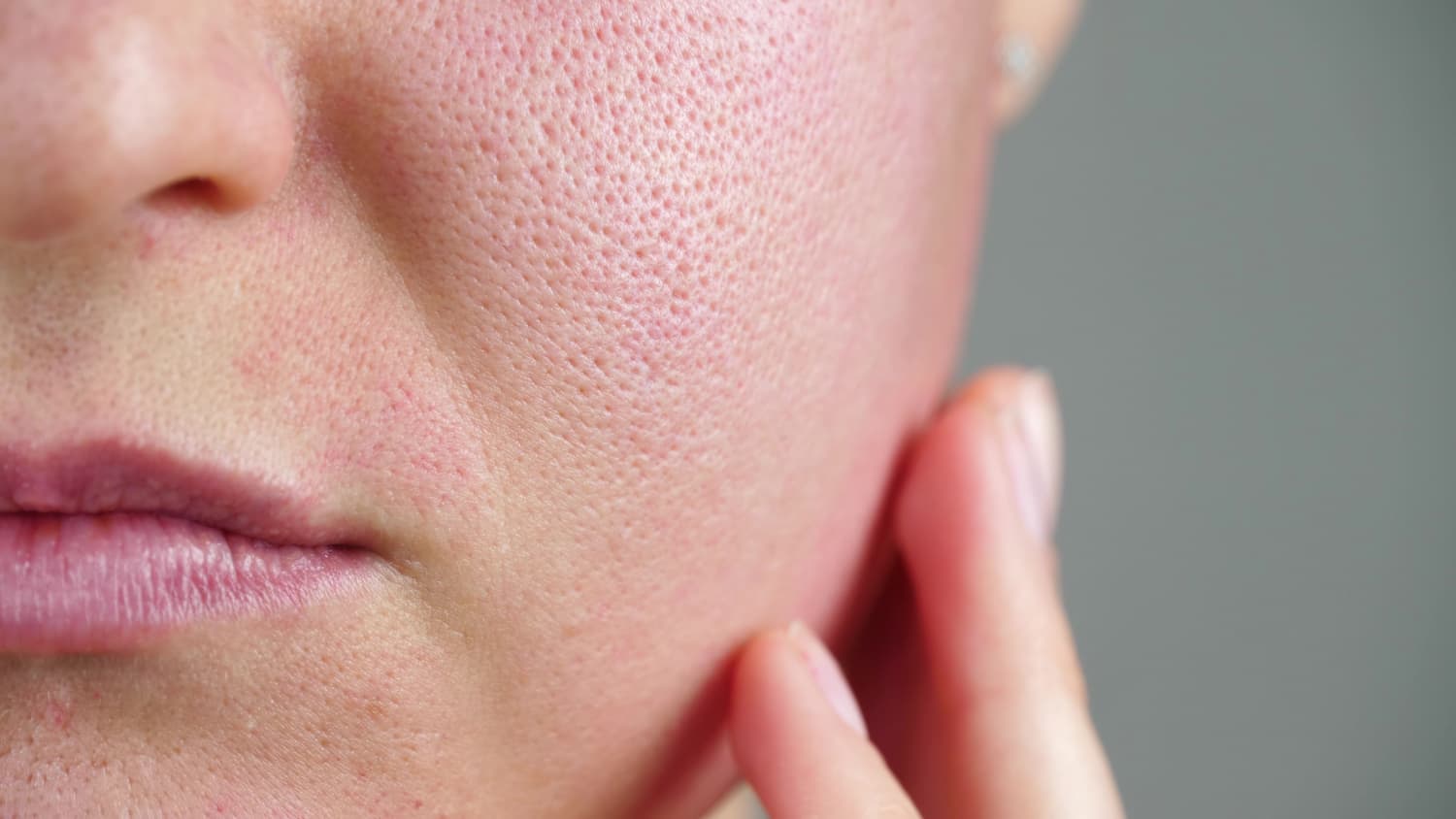The National Rosacea Society designated April as Rosacea Awareness Month to educate the public on this common and potentially serious facial condition as well as to urge those who suspect they may have it to see a dermatologist for diagnosis and the most up-to-date therapy.
Rosacea is a chronic skin condition that causes facial redness, acne-like pimples, visible small blood vessels on the face, swelling, and/or watery, irritated eyes. No one deserves to suffer from the stubborn facial redness and discomfort of rosacea. But it’s out there. And there is a lot of it—an estimated 16 million Americans suffer from rosacea, yet only a small fraction are being treated. So, you’re not alone. In fact, the combined dermatologists and skin specialists at Affiliated Dermatology take care of hundreds of patients with rosacea every month. Thankfully, we see good results with our patients. And many other dermatologists would echo the same.
In surveys by the National Rosacea Society (NRS), nearly 90 percent of rosacea patients said this condition had lowered their self-confidence and self-esteem, and 41 percent reported it had caused them to avoid public contact or cancel social engagements. Among those with severe rosacea, nearly 88 percent said the disorder had adversely affected their professional interactions, and nearly 51 percent said they had even missed work because of their condition. The good news is that well over 70 percent reported medical treatment had improved their emotional and social well-being.
What is rosacea?
Rosacea is an inflammatory skin condition that causes redness, as well as small bumps on the face resembling acne. This inflammation of the face can affect the cheeks, nose, chin, forehead, or eyelids. Rosacea is not contagious, but there is some evidence to suggest that it is inherited. There is no known cause or cure for rosacea and no known link between rosacea and cancer.
Usually, people that have rosacea will come to our office discomforted by the appearance of their facial skin. Significant redness and acne-appearing bumps over the face—especially over the nose and cheeks—are the most common concerns. Many common symptoms may also appear on the neck, chest, scalp, and ears. Signs and symptoms of rosacea include:
- Flushing
- Persistently red skin on the face
- Bumps or acne-like pimples
- Visible blood vessels on facial skin
- Watery or irritated eyes
- Burning, itching or stinging of facial skin
- Skin roughness and dryness
- Raised red patches
- Swelling (edema)
These signs and symptoms may flare up for weeks to months and then go away for a while. Rosacea can be mistaken for acne, other skin problems or natural ruddiness.
Ocular rosacea is a subtype of rosacea that involves the eyes, causing redness, dryness, and sometimes even infections within and around the eyelids. Ocular rosacea is a form of skin disease in and around the eye area that results in eye redness, swelling, burning, and itching. It can sometimes even cause the sensation of having sand in your eyes. Ocular rosacea can be treated by a combination of prescription antibiotics and home eye care. There are several steps you can take in the midst of an ocular rosacea flare-up to ease your symptoms and help it to pass, as well as some things you do to prevent flare-ups in the future. Ocular rosacea is a chronic, non-contagious condition that has no cure, but there are numerous ways to find relief. Always consult your ophthalmologist or dermatologist to make sure any new treatment is right for you.
How do you treat ocular rosacea? About half of rosacea patients will get the dry, irritated eyes of ocular rosacea. Oral antibiotics have been shown to help, so please speak to your dermatologist about this treatment plan. Some patients get relief from isotonic eyedrops and gentle eyelid washes with baby shampoo as long as there is no allergy, but this is also best discussed with an ophthalmologist, especially if you are having other symptoms, like sties, red eyes, or photosensitivity.
Phymatous rosacea is another unique subtype of rosacea that is characterized by irregular enlargement of the surface of the nose.
Who gets rosacea?
Rosacea can affect anyone; generally, it begins after age 30 and goes through cycles of flare-ups and remissions. Over time, it gets ruddier in color and small blood vessels (like spider veins) may appear on the face. If left untreated, bumps and pimples may form, the end of the nose may become swollen, red, and bulbous and eyes may water or become irritated. Rosacea occurs most often among people with fair skin who tend to blush or flush easily. It occurs more often among women than men, but men tend to suffer from more severe symptoms. Most patients experience multiple symptoms at varying levels of severity.
What are the most common triggers?
The cause of rosacea is unknown, but it could be due to a combination of hereditary and environmental factors. Rosacea is not caused by poor hygiene. Different people have different triggers for flare-ups and in many cases, the triggers exacerbate your symptoms by increasing the blood flow to the surface of the skin. Research conducted by the National Rosacea Foundation found that the leading triggers for rosacea are:
- Hot foods and heated drinks
- Spicy foods
- Alcoholic beverages
- Sunlight and sun exposure
- Stress and strong emotions like embarrassment or anger
- Vigorous exercise or heavy activity
- Hot baths, showers, and saunas
- Drugs such as corticosteroids and blood pressure medication
- Wind
- Hot or cold weather
- Humidity
- Certain cosmetics and skin-care products
- Chemical irritation
How do you prevent flare-ups?
At Affiliated Dermatology, we say the best treatment of rosacea is prevention. Rosacea is worsened by sunlight, extreme weather (hot or cold), hot foods, spicy foods, beverages containing alcohol, and stress. Other factors that worsen rosacea have also been recognized. By minimizing your exposure to the factors that worsen your rosacea, you will have an excellent shot at significantly reducing your rosacea. Below, are some skincare basics when it comes to rosacea:
- Cleanse gently
- Beware of the sun
- Moisturize, moisturize, moisturize
- Avoid certain ingredients like alcohol, fragrances, and lactic acid
- Toners are too harsh
- Patch test new products
- Know your triggers
- Protect your skin with sunscreen
To help reduce the incidence of flare-ups, a gentle daily skincare routine is recommended that includes the use of mild, non-abrasive cleansers, soft cloths, rinsing in lukewarm water (not hot or cold), and blotting the face dry (not rubbing). Additionally, individuals with rosacea need to protect themselves from sun exposure by using sunscreens with a minimum SPF 30 or higher and eliminates UVA and UVB rays. Make sure to reapply often. Patients are also encouraged to keep a record of flare-ups to try and determine the lifestyle and environmental triggers that aggravate the condition.
How do you treat rosacea?
There’s no cure for rosacea, but treatment can control and reduce the signs and symptoms. While there is no cure and each case is unique, your dermatologist will probably prescribe oral antibiotics and topical medications to reduce the severity of the symptoms. When the condition goes into remission, only topical treatments may be needed. In more severe cases, a vascular laser, intense pulsed light source, or other medical devices may be used to remove any visible blood vessels and reduce excess redness and bumpiness on the nose.
Additionally, using medications that reduce inflammation in the skin are essential. Many dermatologists favor the use of topical antibiotics that include sulfur or derivatives of sulfur. Other dermatologists favor the use of newer agents that include ingredients like azelaic acid or ivermectin, which reduce inflammation in various ways. The topical medicines often take effect over days to weeks. Unarguably, the best medicine for most rosacea patients is going to be a very low dose of an oral anti-inflammatory/antibiotic called doxycycline. This stuff works great! We also use special topical medicines that temporarily reduce redness in the face. These work by constricting the tiny blood vessels in your skin.
The only semi-permanent treatment for the redness associated with rosacea is light therapy. The commonly used light therapies include Intense Pulsed Light (IPL) and Pulse Dye Laser (PDL). The light therapies work by eliminating the small blood vessels in the face and thus eliminate the redness. The laser treatment works nearly instantly or within 72 hours for results to take effect.
Side effects are minimal with these treatments. The medicines we use for rosacea are some of the safest medicine that we use in our office. However, patients may experience an upset stomach when taking oral tases medicines on an empty stomach. Also, some people have skin that simply disagrees with some of the topical medicines, where they may experience dryness or skin irritation. This is why it’s very important to have a dermatologist manage your treatment and make necessary adjustments when appropriate.
There are no guarantees in medicine, but our patients being treated at Affiliated Dermatology do very well in making improvements with this condition. If the first treatment does not work for a patient, then the next treatment will. Our patients do not give up on treating rosacea, so neither do we. In other words, we will be sure to fix rosacea. Most patients are on long-term treatments. Often, treatments are discontinued or weaned and continued again. In accord, keeping a close relationship with a dermatologist is very important.
Should I see a dermatologist?
Yes! About 3 out of 5 people that visit our offices have some form of this condition, so we make sure to take our time with our patients and discuss all of the things that may cause their rosacea to flare. For example, pointing out items in their diets like spicy foods, citric foods, alcoholic beverages or daily activities in the sunlight can all cause significant rosacea. Oftentimes, our patients will make a remark like “…so everything good in life will worsen my rosacea?!” Unfortunately, yes many tasty foods and favorite activities worsen symptoms. The good news is that our dermatologists can help people with this condition by using topical and/or oral medicines. We also can recommend certain rejuvenating laser treatments to help rosacea.
Best Skincare Products for Facial Redness
This collection of clinically tested products helps to soothe and calm inflamed, irritated skin or rosacea-prone skin while delivering long-term skin health benefits—most products are available in-office, online, or by drop-ship.
Colorescience – All Calm® Clinical Redness Corrector SPF 50
All Calm® Clinical Redness Corrector SPF 50 is both an immediate and long-term redness and sensitivity reducer, meaning once you have the product in hand, you don’t have to wait a minute longer for relief. This 3-in-1 proprietary formula instantly neutralizes the appearance of redness, helps soothe and calm sensitive skin, and provides SPF 50 protection while its patent-pending BioSolace™ complex helps provide ongoing relief from sensitivity and the appearance of redness.
EltaMD – UV Clear Broad-Spectrum SPF 46
Your rosacea-prone skin can be sensitive, which is why you must choose products that are gentle and protective like EltaMD’s UV Clear Tinted SPF. This oil-free option helps calm and protect sensitive skin types prone to discoloration and breakouts associated to acne and rosacea. It contains niacinamide (vitamin B3), hyaluronic acid and lactic acid, ingredients that promote the appearance of healthy-looking skin. Very lightweight and silky, it may be worn with makeup or alone. This daily sunscreen is formulated with zinc oxide to protect your skin from the rays of the sun. It goes on clear and won’t worsen rosacea, allowing daily use.
SkinMedica – Lytera 2.0 Pigment Correcting Serum
Want to address stubborn skin discoloration? Now you can with SkinMedica’s Lytera 2.0 Pigment Correcting Serum. As a part of a skincare routine specifically formulated to target redness, discoloration, and irritation of the skin, this serum is designed to help improve your skin’s overall tone and evenness as it optimizes the effectiveness of other treatment approaches. A fabulous choice for all skin types.
SkinMedica – HA5 Rejuvenating Hydrator
Smooth and soothe your skin as you support its natural ability to heal and protect with SkinMedica’s HA5 Rejuvenating Hydrator. This oil-free, fragrance-free moisturizer is a great choice for all skin types and promotes the health of your skin by encouraging it to replenish its own stores of hyaluronic acid and stay moisturized. Provides immediate smoothing in the appearance of fine lines and wrinkles, and supports the skin’s natural ability to retain moisture resulting in radiant, rejuvenated tone and texture.
Sente – Dermal Repair Cream
Improve the appearance, texture, and firmness of your skin with Sente Dermal Repair Cream. A deeply hydrating, repairing cream to reduce visible redness, improve the appearance of fine lines and wrinkles, for healthy, even-looking skin. This formula was created specifically to address the appearance of damaged skin, enhancing your natural skin tone and leaving your skin youthful looking and luminous. Contains green tea extract, a gentle antioxidant to help soothe skin.
PCA SKIN – 4 Step Redness Relief Regimen to Calm, Soothe, & Hydrate
Reduce redness and sensitivity while improving the skin’s barrier function with this powerful four-step regimen from PCA Skin to calm, soothe, and hydrate: Creamy Cleanser, Dual Action Redness Relief, Clear Skin, and Hydrator Plus Broad Spectrum SPF 30.
If you are having bad flare-ups, can’t control breakouts, or aren’t sure if you have rosacea, schedule an appointment with your dermatologist. We can suggest a treatment that works for the specific variant of the disease you have. There are myriad topical medications, oral pills, and lasers that can all be used to help symptoms and control rosacea, and our dermatologists can help you figure out the best treatment plan. If you think you have rosacea, then we are here to help you!






